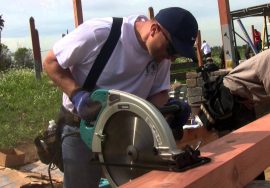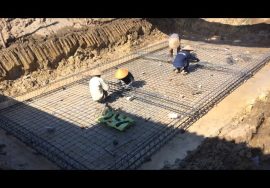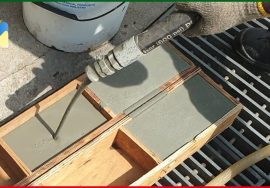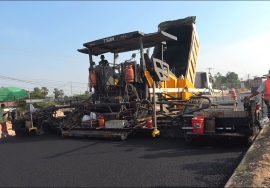Stone Cutting Techniques & Technology Used in Construction of the Ancient Megalithic Sites
Contact us to Add Your Business
In this presentation, we journey across the word’s most iconic megalithic sites, exploring stone cutting techniques and technology was required to construct them.
This channel is under ZEG UK/USA/PM LTD & AdRev Management.











Really great presentation and compilation of the many points of interest when trying to come to terms with the mysteries of how these ancient builders fabricated, quarried, how they fashioned these massive slabs, and moved them, how they built these incredible structures, and for what exact purpose, and what time period, and who were they? I’m positive there have been items found and hidden away by Governments orders, some items that might be relevealing and important in answering these questions could well be lying in underground vaults like the Vatican Achives, it makes me so angry that our self appointed so-called leaders become our Jailers and the keepers of secrets to the knowledge that belongs to each and every one of us, it’s our right to know, they do not have the right to withhold this information, we could be so far ahead in advanced technologies if we were able to have access to this knowledge, this is how they create and maintain the system of privilege and wealth by keeping us in the dark and only allowing us to use oil and gas, coal and steam, while they manipulate our media, propergate miss-information, withhold, distort and fabricate our History!
Exactly’ we see it’ times about to change “We Oppose Deception.
I was very sad and angry when I started learning that they whoever they are have been controlling and altering the truth. To the them we are simple things to use propaganda on. The dumber the people are the easier we are to control.
I would love to visit ALL of these places one day. I have personally cut and fabricated natural stone for the last 20 years.
What strikes me about these block walls (only 25 mins in) is that you keep saying “perfectly cut” multi -sided blocks. But looking at the blocks, lots of the “cuts” are not straight and have curves to them. The front faces dont seem to be totally finished as their are still knobs or nubs on the faces and you can see other walls that have been grinded back and sanded to have a totally flat face to the wall. I believe you showed a curved wall section like this. This to me is a finished wall and it leads me to think that whatever happened may have been very sudden and caught people in varies stages of construction. Lots of the sites seem to be in either a bit of disarray or not completed.
I love how they used water and natural springs to flow through the buildings and “towns” that they built.
I have been trying to tell people that just because you dont have electricity and power tools, does not mean that you dont have blades, saws, drills, chisels and abrasives. I also believe in the theory of these casing stones being a type of geo-polymer as their writing disscussed a mixture for “softening stones” which could have been a natural acid applied before putting the stones together to get them to fuse or chemically melt in place. This would help explain the not straight cuts between the blocks.
In my stoneshop we have a 3 large barrel water filtration system as well as large bleed bags and a settling pit. When we bleed the system into these large bags to collect the slurry and solids, the bags eventually fill up. If we do not dump them within a week they dry out and become hard as a rock. I had an idea a while back to bleed these bags into forms and make slurry blocks. I am not sure how they would hold up to the winter, but we could add some portland or fly ash to it and it would be a type of stone slurry concrete. Just saying we could make them as a waste product from our stone fabrication process. We work 80% limestone and sandstone, granite can be tough to finish by hand but we can accomplish whatever.
Thanks for the good content. Keep up the videos
It was good to hear from someone who knows how stone is worked and has experience to back it up. Unlike those experts who have never worked a single stone who make claims of impossibility.
Thank you very much.
“This to me is a finished wall and it leads me to think that whatever happened may have been very sudden…” you mean to say unfinished wall, is it? All in all insightful writing.
I also have some masonry experience working primarily with natural material. Cutting out the middle-hand of industrially prepared materials really provides for an epistemological break regarding what is possible without large scale modern industrial means.
Thanks for some insight!
They were poured into molds and built from the ground up. Pyramid K 2019. Watch it and let me know what you think.
Thanks. You cleared some of the points.
The inside of the box inside the Kufu pyramid wasn’t cut or chiseled out, it was drilled out, with a rotation speed of 36000rpm (we today can only achieve a tenth of that with diamond-tipped drills) and a sinking speed of 2mm per rotation, meaning there was a downward pressure on the drill of around two ton. These findings come from Christopher Dunn.
Amazing
Love Mr dunns videos, I believe he is spot on with alot of his findings
Yes my dude! So well presented, and so much put in there from around the world. Nicely done sir. There are a few important places I would like to see added, but I really appreciate that you managed to get all this in there.
I am Mexican and a carpenter by trade and I can see exactly how these Stones were put together as a carpenter we have to figure out intricate cuts on exposed beams massive beams that we have to install and there is other methods on figuring out other cuts by this simple method when a carpenter reads this comment he’s going to realize that this is the way it’s done basically all you really need is a framing square which I’m sure they figured out how to make one out of wood and a measuring stick we have measuring tapes nowadays another key element you need is a level ground by now you have guessed how it’s done in our field we call it snapping it out. What I can’t figure out is how they were moved around the massive ones especially the smaller ones I’m sure they were hoisted up that’s why they have those bumps protruding out from the side.
The odd protrusions aren’t placed correctly for lifting bosses.
One of the best videos you guys have posted. Please keep the longer content coming this is incredible.
@Tyrion Lannister What did this video get wrong?
There is a very interesting video about a pyramid-like object in Russia. Watch it in my profile!
@John Thomas
I agree, people who watch these videos and feel like they are learning, need to go get a job working with stone.
I’ve worked in quarries and I’m particularly good at polishing, the step before install.
It took me countless pads of sand paper, modern pneumatic tools and forklifts to move it, and a week to do one to two slabs, depending on the specific needs of the customer.
If you want granite to appear wet when it’s not and have a reflection of yourself in it, that’ll take a over a week of 10-12 hour days one one slab alone.
The more they want done the slower the process.
Bevels take time, rounding edges takes time, cutting into it to look like crown moulding takes time.
But, these people have zero idea what has to happen between quarry to install.
In antiquity, the masons had their own students and actual slave armies to do the hardest things for them. Which made the processes feasible.
How would these couch detectives know this?
It was terribly worded, with precisionly and utilised etc, but you’re not wrong about it being a great video.
Absolutely amazing ancient builders fascinates me always have love this stuff. I work construction all my life and it would be a challenge with modern-day equipment to do what they done
If the stones were poured rather than carved there would be no need to cut keyways for the metal clips. They could simply have incorporated the metal clips into the stone when it was poured. Just like the way we use rebarr in concrete construction. They did not appear to have done that.
Maybe the notches sticking out of the Rock were used to transport the huge megalith, but even then with their advanced stone cutting, they could have easily removed the notches and made a smooth rock face after it was placed. I think the notches served another unknown purpose
The only I can think of that might scoop granite out of it’s pocket like that would be a white hot u-shaped tungsten wire like they cut styrofoam with. Nothing else besides vibrating chisels could cut inverted sharp corners. If you did use chisels you would destroy the piece you’re cutting out. Electricity and tungsten wire.would cut scoops out of the rock and leave a melted surface.
Another point to marvel pertaining to the pre Inca walls is not just the precision polygonal joints. But the fact that those walls are weathered since construction. They must have been abosultly magnificent.
I have done a lot of construction. Cutting out the perfectly cut stone with the flowers around it, doesn’t even seem hard. The line cuts are the only hard part, Cut the lines as deeply as you can, then chip out the middle.
Wonderful presentation of so much information! Bravo and thank you!
The huge cut out rocks in China are soooo amazing. This is the first time I’ve ever seen anything about them
What a pleasure. Appropriate comments with the appropriate photographic references. Thank you so so much. At last a thought provoking presentation.
Have you ever seen glass being blown? In the end the tube with heated air has to be removed from the glass and it ends up leaving a “notch” in the glass not unlike the notches in the megaliths. Think of it as the tip top of a hersey’s kiss (sideways).
Hershey’s kiss?
Exactly what I’m saying!
Very nice presentation. I love the relaxed tone and runs like its wasn’t constantly being edited, just like a conversation… thank you.
There is a very interesting video about a pyramid-like object in Russia. Watch it in my profile!
The book of Genesis might offer some interesting topics. Sons of God, Giants and a Great Flood. These are remnants of the first world. And there is a reason it had to be destroyed. Very nice presentation!
This was an amazing video. This is the first time for me of seeing these strange stones and unusual stone cuttings. Wow it does make you ponder.
I’m going to put forth a crazy story for all of this. It’s a made up story that I don’t really believe but its something to help my brain make sense of what I am seeing.
Years ago a long long time ago..
Beings from a long away place discovered this tiny rock called Earth.
Their ship crashed and they had to learn to live on this rock.
Luckly they still had all their tools and sophisticated machines.
They world together all over the planet and started to build machines to help them in their quest to contact their home world for a rescue.
They built machines using the stones and from those stones they built large pyramids and monuments which functioned as long range communication devices.
And they also discovered since they were from distant stars that there was going to be a collision into the Earth that would destroy most of the living beings.
And they did manage to get rescued finally just before the collision and they left taking all their tools which they needed to make the trip back to their home world.
They did leave enough to help planet Earth rebuild back the life it lost. They safely buried tons of items to await the Earth to recover from the collision. Basically seeding the planet. Their was very little left and only a few humanoids to rebuild but because people emerged from different parts of the planets they developed differently from the ancestors that left.
There still might be explanations left of these people but we just haven’t yet found it.
So we much continue searching…
There is a very interesting video about a pyramid-like object in Russia. Watch it in my profile!
That actually makes a lot of sense
There are two candidates for the proposed cataclysms. The first is the climatic reversal known as the Younger Dryas ( about 12,000 years BP) when the planet returned to glacial conditions and lasted about 1000 years, before warming resumed. The second is a recently recognised bolide explosion that occurred over northern Chile also dated at about 12,000 years BP. The heat generated was enough to melt the desert surface to depth of 10cm. Depending on the intensity and duration of the thermal ‘flash’ central Peru and Bolivia could have been devastated and left bereft of life. More research is called to explore these events.
Interesting about the bolide explosion. If it happened at the same time as the Younger Dryas it likely was part of the same event